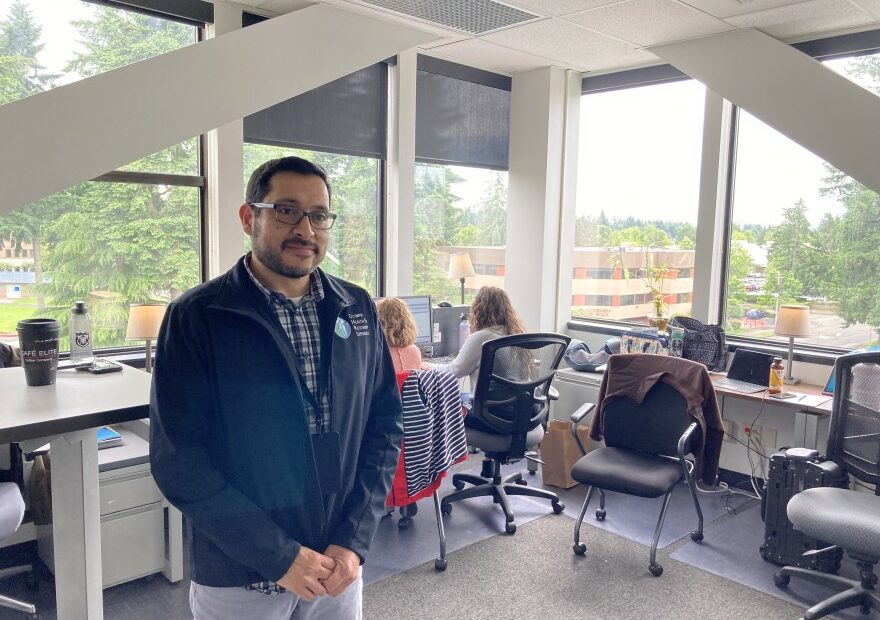On a recent afternoon in Lacey, Washington police were dispatched to a report of a domestic assault that had occurred on the street in public view. Passersby reported that a man had pushed a woman to the ground and kicked her.
When the first officer arrived, he ordered the man, who was holding a glass bottle, to his knees.
Instead, the man turned toward the officer and started yelling, according to a police report of the incident. At that point, the officer pulled out his Taser and called for back-up.
Soon a second officer arrived. And then a third. When efforts to verbally de-escalate the situation failed, the officers resorted to physical force. According to the police report, they used a two-hand, hair-hold takedown to force the man to the ground and handcuff him. He was taken to jail.
This wasn’t the first time Lacey police had come into contact with the man. In fact, just the day before officers had been called to the man’s apartment complex. The manager reported that he was threatening other tenants and pounding on the office door.
Ultimately, a Designated Crisis Responder (DCR) determined the man was experiencing a mental health crisis and met the criteria to be involuntarily detained. That’s a high bar. The DCR must find that a person poses an imminent threat to themselves or others, or is gravely disabled.
But, unlike in similar cases in the past, this time the police did not agree to transport him to the hospital.
The sequence of events that played out in Lacey in early June – where officers walked away from someone in a mental health crisis one day, only to arrest the same person the next — is one that police and mental health workers across Washington are warning is likely to become more common.
They say it’s an unintended consequence of a new police use of force bill that passed the Legislature earlier this year. That law, House Bill 1310, which takes effect July 25, was part of a package of police accountability measures adopted by majority Democrats during the 2021 session.
The use of force measure aims to address discriminatory policing and excessive force by requiring officers to act with reasonable care and use de-escalation tactics. Specifically, the new law says officers should only resort to physical force when there’s probable cause to make an arrest, to prevent an escape or to protect against an imminent threat of harm.
If there isn’t an imminent threat and no crime has been committed or is about to be committed, the law says officers should consider leaving the area.
The law also instructs officers to consider the characteristics and conditions of the person, including whether they’re displaying signs of a mental or behavioral impairment, before resorting to physical force.
Police in Washington say the language in House Bill 1310 creates substantial new liability for officers who resort to physical force, especially if the person is vulnerable or hasn’t committed a crime. Under the new rules, they say police officers will be much less likely to assist, as they traditionally have, with civil – or non-criminal – matters that might result in a use of force, such as detaining and transporting someone in crisis.
“We teach our officers on de-escalation and crisis intervention training, but that being said we still need to make sure that we avoid the potential for a use of force under the new mandates,” said Robert Almada, the interim chief of the Lacey Police Department. He added that he thinks the goal of the legislation is “laudable.”
In neighboring Tumwater, police Chief Jon Weiks was more blunt in a letter headlined “Mental Health Crisis & Police Response.”
“What will this look like for our officers and community going forward,” the chief asked. “Officers will be detaining fewer people who are experiencing a mental health crisis and may not respond unless an ‘imminent threat’ or criminal activity is identified.”
Two of Washington’s larger police agencies, the Seattle Police Department and King County Sheriff’s Office, said in statements that they are reviewing their policies and procedures in response to the new legislation that passed this year, including House Bill 1310.
Historically, front line mental health workers and police in Washington have worked closely together.
This is in part because the work can be dangerous as highlighted by the 2005 murder of Marty Smith, a crisis responder on the Kitsap Peninsula, who was beaten and stabbed to death when he went to check on a client.
After that incident, state lawmakers passed the Marty Smith law which requires crisis responders to be accompanied whenever they respond to a private home or location. Often in those cases the mental health worker will call the police department to ask for an officer to meet them at the location.
Crisis responders must also call for a secure transport for clients who are being involuntarily committed to a mental health facility. For that, they typically depend on the police or ambulance crews.
But now that hand-in-glove relationship is being put to the test.
The new use of force law has touched off a flurry of phone calls and meetings in communities across the state as police, prosecutors and mental health responders try to determine the new rules of the road, and come up with a consistent way to respond.
In a letter to his members this month, Steve Strachan, the executive director of the Washington Association of Sheriffs and Police Chiefs (WASPC) said societal expectations are changing about what calls police “can or should respond” to.
Citing the urgency of the situation, WASPC is offering a webinar this month titled “HB 1310 and liability related to non-criminal calls” to help agencies trying to implement the new law. The event will feature legal advisors to police and sheriff’s departments on both sides of the Cascades.
“It’s going to change the rules of engagement, it’s going to require a lot of training and retaining of people,” said Aaron Jelcick, the interim chief of the Olympia Police Department.
While the new law doesn’t take effect until late next month, some police departments are already changing their policies and procedures.
For example, in the town of Sedro-Woolley in Skagit County, Chief Lin Tucker has instructed his officers to act as if the law is already in effect. As a result, that changed how they approached a call earlier this month involving a man who appeared to be under the influence of drugs and was acting erratically.
In a lengthy Facebook post following the incident, Tucker explained that multiple officers trained in crisis response, along with a Mobile Crisis Outreach Team, spent nearly two hours trying to talk the man into cooperating. During that time, he damaged his own car and motorcycle, bit a tree and stripped to his underwear.
Unable to convince the man to voluntarily go to the hospital, they eventually talked him into going back inside his home. Officers left the scene only to be called back a short while later because the man was once again outside yelling and screaming.
“As recent as a month ago, we would have spent some time negotiating with this guy and when that failed, we would have quickly subdued him and he would be receiving treatment in the E.R.,” Tucker wrote in his Facebook post.
Instead, Tucker continued, the new use of force law “forced us not to act and to walk away.”
The situation is also now on the radar of state lawmakers.
Democratic state Rep. Roger Goodman, who chairs the House Public Safety Committee, said he plans to meet with sheriffs and police chiefs in the coming days to discuss their concerns.
The goal of the new law, Goodman said, was to reduce the use of physical force, not get police out of the business of assisting with mental health calls.
“If that individual is suffering from a mental health crisis and is a threat to themselves or others, police are obligated under the law to take them to a secure, therapeutic facility,” Goodman said.
Goodman said he would be open to amending the law to clarify its intent.
In a separate statement, the sponsor of House Bill 1310, Democratic state Rep. Jesse Johnson, said: “As we implement new laws to protect families from police violence, I will monitor the model policy for 1310 developed by the Attorney General’s office and any concerns that arise through the implementation process.”
In the meantime, police and mental health workers across Washington are navigating a new reality — one where officer may decide that a crisis responder’s determination that someone poses an imminent threat isn’t enough to risk a use of force incident.
On a recent weekday, a team of DCRs at Olympic Health and Recovery Services (OHRS) fielded crisis calls and kept tabs on their colleagues in the field. OHRS operates a 24/7 crisis line for Mason and Thurston Counties that gets about 25,000 calls a year. In addition, OHRS provides involuntary treatment assessments in a seven county region that includes southwest coastal Washington.
One of the crisis responders, Michaela Holsinger, said that over the past month she’s encountered several instances where police were unwilling to transport someone that she had determined met criteria for involuntary commitment to a mental health facility.
As with the case in Lacey, Holsinger said when someone in crisis doesn’t get mental health help right away, the situation can quickly deteriorate and result in a criminal matter.
“I have had that personally happen where I assessed someone, found that they met criteria for detention, police refused to transport and then we got a call six hours later and that person was in jail because they had done something,” Holsinger said.
The idea that someone in a crisis wouldn’t get help until they’ve committed a crime is not an outcome mental health responders or the police want — and the situation has come as a surprise.
“I think I can say that this wasn’t on our radar, that this would happen as a result of legislation,” said Joe Avalos, OHRS’s administrator. “I do think it was unintended.”
Jelcick, Olympia’s interim chief, said he supports the spirit of House Bill 1310, but thinks lawmakers put the “cart before the horse” by not first funding additional mental health services in the community.
“My concern is those folks that really need the help, more of them are going to slip through the cracks and we’ve got to figure this out,” Jelcick said.

















